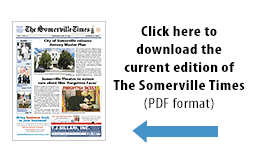(The opinions and views expressed in the commentaries of The Somerville Times belong solely to the authors of those commentaries and do not reflect the views or opinions of The Somerville Times, its staff or publishers)
By André Leroux, Massachusetts Smart Growth Alliance & Joseph Curtatone, Mayor of Somerville
Our cities and towns deserve a modern set of tools to plan ahead for growth. We must be able to ensure that development takes place wisely, spares tax dollars from waste, and protects our environment. Development proposals should be based upon community values and local planning priorities. But in too many communities, smart community-minded development proposals are subject to legal wrangling and costly delays. Meanwhile lower-quality proposals are often permitted more quickly because that is what our outdated regulations encourage.
The status quo threatens Massachusetts’ economic future—and our quality of life. Our state’s outdated zoning, planning and permitting laws make it cheapest and easiest to build projects in haphazard locations that may waste taxpayer dollars. This “sprawl” costs up to twice as much in public infrastructure, costs 10% more to maintain in services, and produces environmentally unsustainable growth.
It is time for sensible reform. While local communities like Somerville are making progress by implementing comprehensive planning and overhauling local codes, all of our communities could do much more with a strategic reform to our state’s development laws. Development regulation reform would give local communities all of the tools they need to pursue smarter development. Our state’s laws governing development, including our state zoning act, have not been updated in 40 years.
Fortunately, there is a bill pending on Beacon Hill that begins to fix this. House Bill No. 1859, “An Act Promoting the Planning and Development of Sustainable Communities,” is practical legislation that gives Massachusetts cities and towns clear authority and flexible tools to plan, develop, and protect our communities.
The proposal will make it quicker and cheaper for communities to decide where to sensibly grow and where to preserve land by making master planning more flexible and less costly. It encourages communities to establish districts for prompt permitting of housing and commercial growth while adopting environmental protections. The law will also determine development impact fees by a formula, curbing contentious negotiations with developers over the cost of infrastructure and other community impacts.
Our antiquated zoning laws hurt our environment as well. Every day in Massachusetts, 22 acres of forest and farmland are converted primarily to low-density residential sprawl. One contributor is an obsolete process called “Approval Not Required” (ANR) roadside development, which is almost unregulated, even on dirt roads or roads that might only exist on paper. We are the only state in the nation that allows this. The Sustainable Communities act would enable a city or town to replace ANR with an expedited review process with some teeth in it. Additional critical provisions would allow communities to improve the siting of development to protect our landscapes, reduce flooding, and recharge our local water tables and streams.
Let’s take development fights out of the courts. This bill brings our zoning law into the 21st century and clarifies many gray areas of the law so that everyone can understand what it means. The legislation would create standardized zoning protections once an application for a building permit, special permit, or subdivision plan is filed. It encourages development disputes to be resolved by mediation rather than court battles. It provides clear local authority for modern-day practices such as inclusionary zoning to spur affordable housing development, natural resource protection zoning and site plan review. It would also encourage more communities to develop form-based codes, which focus on a community’s character instead of relying on archaic regulation of uses that limit commerce in our city and town centers and squares.
The zoning reform bill is driven by the expertise of many groups that care about sensible growth and the quality of life in our communities, such as the Massachusetts Smart Growth Alliance, the Massachusetts Public Health Association, and the organizations that represent municipal attorneys and planners.
We can’t squander this historic opportunity to pass zoning reform before the legislative session ends July 31st. The bill costs the state nothing and will save cities and towns money. Its passage will be an important step toward a fair system of development rules that will reduce haphazard development and encourage all of our communities to plan ahead for the growth our state needs.















Reader Comments